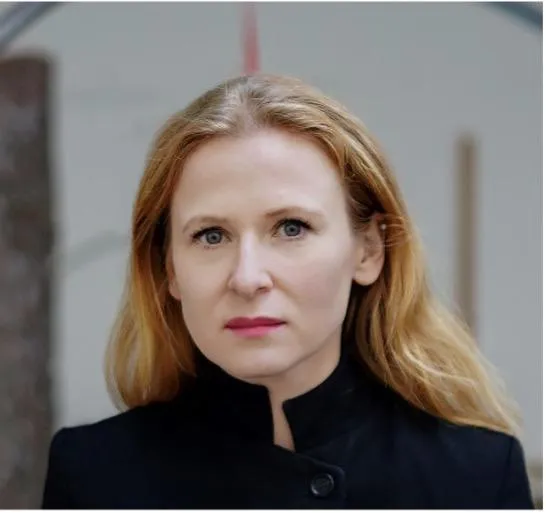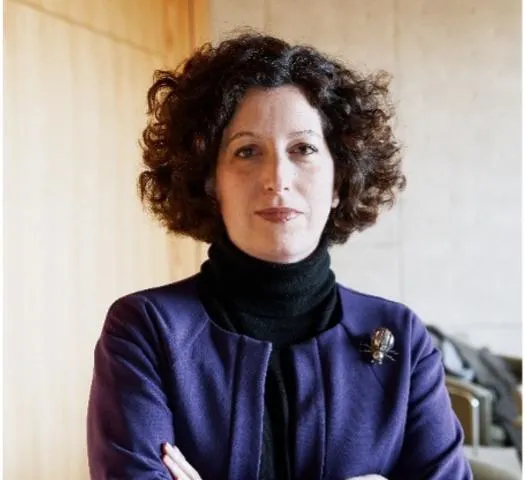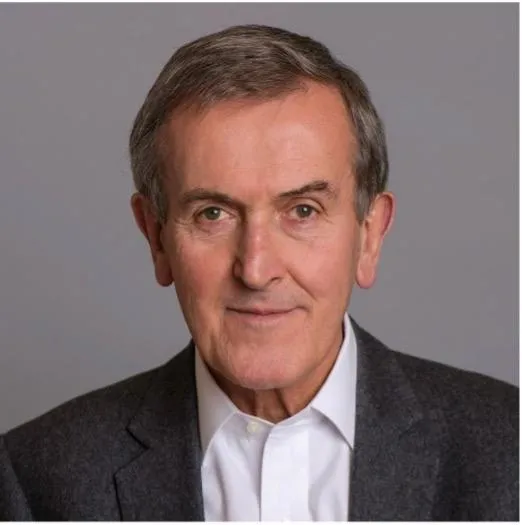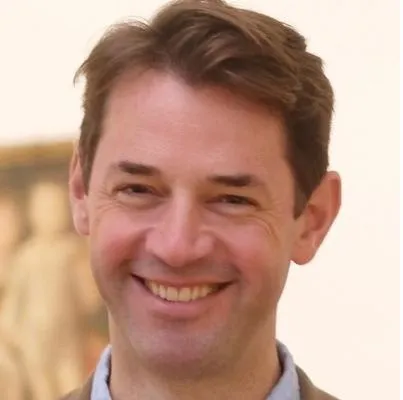Please note: this event has passed
It’s a kind of tragic thing to be a human being because we are trying so hard to understand the world but actually, there is no chance. We are building systems, political structures or religions to make this doable and as easy as possible to survive in it. Actually, it’s a bit absurd.
(Alicja Kwade)
Alicja Kwade, María López-Fanjul y Díez del Corral, Neil MacGregor, and Ben Quash
Akademie der Künste, Pariser Platz 4, 10117 Berlin-Mitte
This three-way panel conversation aims to explore the relation between contemporary art and religion from a range of perspectives. Combining the insights of a leading contemporary artist, and two distinguished art historians and curators, it will be chaired by the theologian Professor Ben Quash of the Centre for Arts & the Sacred in London.
This dialogue will be of interest both to art scholars and art enthusiasts—both those sympathetic to religion and those critical of it; those with faith as well as those with none.
The abiding power of Christian motifs, ideas and styles in a host of modern and contemporary works that superficially look un- or anti-Christian indicates that visual art and Christian tradition have not become complete strangers. This invites analysis and understanding.
How have religious artworks and artistic traditions found new articulations, caused new departures, or provoked new subversions in the last 100-150 years? What forms of engagement between theology and modern and contemporary art do such developments in the relationship between art and Christianity invite and reward?
How do viewers (religious and non-religious) interact with historical Christian art today, and how do modern sensibilities affect our viewing of earlier Christian artworks and artistic traditions?
Is contemporary art an alternative to religion or can it sometimes be an ally? How do contemporary art and religion each respond to human experiences of the absurd or the tragic? What do contemporary art and the spaces in which we encounter it, tell us about the histories of both Western Christianity and Western secularisation?
These and a range of other questions will be the topic of a lively discussion in Berlin’s Akademie der Künste, 6–7.30 pm on Monday 6th June 2022.
All are welcome. Tickets are free, and can be reserved at Webshop (eventim-inhouse.de)
Speakers

Alicja Kwade, Artist
Alicja’s diverse and internationally-celebrated practice engages with both science and philosophy to investigate elemental structures of both society and wider reality. Her work can be critical of religious ideas while at the same time inviting descriptions like ‘metaphysical’, ‘mysterious’, and ‘cosmic’. Frequently working on an ambitious scale, she uses sculptural objects, video, and photography to explore what cannot be seen by the natural human eye, to evoke transcendence, and to offer her audiences what might be described as a contemporary ‘sublimity’.

Dr María López-Fanjul y Díez del Corral, Senior Curator of the Bode Museum and the Gemäldegalerie.
Through her acclaimed Der Zweite Blick (‘Second Glance’) initiatives at the Bode-Museum, she has developed innovative ways of challenging museum-goers to look at historic objects with new eyes. Her adventurous curatorial practice invites visitors to think about contemporary questions with the help of ancient artefacts, thereby exposing deeper continuities between the art of the past and the art of the present.

Dr Neil MacGregor, Formerly Director of the British Museum London and National Gallery, London.
Neil has both championed and pioneered the newly serious exploration of Christianity, as well as of other religious traditions, in the international museum world. He has done this through a succession of groundbreaking exhibitions and broadcasts including Seeing Salvation, A History of the World in 100 Objects, and Living with the Gods. These have radically changed the way that religions are understood and presented in the contemporary cultural sector.

The Revd Professor Ben Quash, Professor of Christianity and the Arts, King's College London.
Ben is fascinated by how the arts can renew people’s engagement with the Bible and Christian tradition. He set up the Centre for Arts and the Sacred at King’s College London, where he runs an MA in Christianity and the Arts in association with the National Gallery, London. He broadcasts on BBC radio and his publications include Abiding: The Archbishop of Canterbury’s Lent Book 2013 (Bloomsbury, 2012) and Found Theology: History, Imagination and the Holy Spirit (T&T Clark, 2014). He is Director of the project, ‘Theology, Modernity, and the Visual Arts’ which has convened this evening’s panel event.
Theology, Modernity, and the Visual Arts project
This free, public event is part of a four-year research project on the topic of Theology, Modernity, and the Visual Arts, led by Professor Ben Quash at King’s College London, in collaboration with Duke University, and generously sponsored by the McDonald Agape Foundation. (i) Its purpose is to enquire into a theological reading of modernity in the company of visual artists, asking how the visual arts can help us to understand the theological (or even anti-theological) currents of modernity more deeply. Theology, Modernity, and the Visual Arts is part of a larger enterprise (Theology, Modernity, and the Arts) established by Duke Initiatives in Theology and the Arts, which is undertaking research in three main areas: music, the visual arts, and literature.
The programme for Theology, Modernity, and the Visual Arts consists of a series of academic symposia hosted by major international art galleries in the UK, USA, and Europe. It began in 2018 at the Royal Academy of Arts, London and continued in 2019 at the School of the Art Institute of Chicago. Attended by a core group of international scholars in theology and art history, these meetings provide an opportunity for a sustained discussion of how the visual arts can help in interpreting the theological dimensions of modernity, and how theology can reflect on and inform interpretations of modernity in and through the visual arts.
The group is exploring what theology can learn from the insights and suggestions of modern and contemporary art, even when that art seems deliberately to provoke or repel. Given the abiding power of Christian motifs, ideas, and styles in a host of modern works that superficially look un- or anti-Christian, the group is also considering these indications that visual art and Christian tradition have not become complete strangers, and asking how contemporary viewers (Christian and non-Christian) interact with historical Christian art, and how modern sensibilities affect our viewing of earlier Christian artworks and artistic traditions.
The symposia are accompanied by public events with high-profile artists, theologians, and critics. These are opportunities to reflect on the visual arts as an arena in which some of the deepest questions of life and death, meaning and purpose, continue to be raised, and on the relationship of visual art with Christianity, both as cultural heritage and as contemporary lived faith.
Theology, Modernity and the Visual Arts (TMVA) (kcl.ac.uk)
2019 TMVA: Idols and Taboos: Modern & Contemporary Art and Theology Today (kcl.ac.uk)
Theology, Modernity and the Visual Arts, Principal Scholar: Professor Ben Quash, Professor of Christianity and the Arts, King’s College London; Director of the Centre for Arts and the Sacred at King’s (ASK). https://www.kcl.ac.uk/artshums/depts/trs/research/ask/index.aspx
Theology, Modernity and the Arts, Project Director: Professor Jeremy Begbie, Thomas A. Langford Research Professor, Duke Divinity School; Director of Duke Initiatives in Theology and the Arts; Senior Member at Wolfson College and Affiliated Lecturer in the Faculty of Music, University of Cambridge. https://sites.duke.edu/dita/research/
The McDonald Agape Foundation ‘Encourages Distinguished Scholars for Christ’ at elite Universities with scholars and leaders who attain both the highest levels of scholarship and represent strong models of spiritual knowledge and faith. http://www.mcdonaldagape.org
Event details
Akademie der Künste
Akademie der Künste, Pariser Platz 4, 10117 Berlin-Mitte
